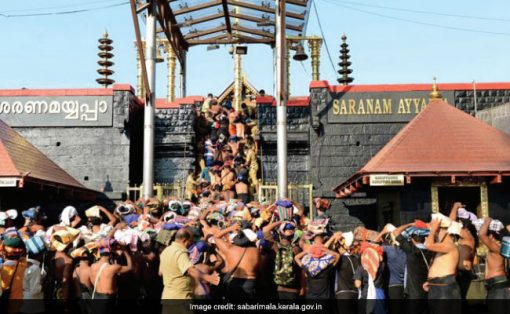The Article 15 of the Indian Constitution prohibits discrimination against any person or community, be it on the basis of religion, race, caste, sex, place of birth. This is what a Supreme Court bench — chaired by CJI Dipak Misra, and comprising of five senior SC judged — reiterated during a hearing of the Indian Young Lawyers’ Association and another Vs The State of Kerala and other (Respondents) case regarding the ban on the entry of women in the Sabarimala Temple, Kerala.
During the hearing of the case, the CJI noted, “In a public place of worship, a woman can enter, where a man can go. What applies to a man, applies to a woman.” The Sabarimala Pilgrimage in Kerala is one of the largest pilgrimages in the world; the shrine of a “celibate” Hindu god Lord Ayyappa, it restricts the entry of females after they attain puberty; they can only enter the temple after menopause. According to some, the tradition goes back some 800 years. The restriction of women between the ages of 10 and 50 is based on archaic and patriarchal notions of “impurity” and “pollution” associated with menstruating women.
In the S Mahendran vs Secretary Devasvom Board Commission case, a Kerala High Court bench had acceded to the demand that women be barred from entering the temple until they reach menopause. This was a clear case of gender-based discrimination, violating women’s fundamental right to equality (which includes access to public spaces).
The Supreme Court’s assertion — that places of worship are public spaces, and therefore everyone must have equal access to these places — is a welcome departure from the Kerala High Court’s judgement in the matter. On day two of the hearing of the Indian Young Lawyers’ Association and another Vs The State of Kerala and other (Respondents) case, senior lawyer Indira Jaising argued:
Article 17 of the Constitution banned the practice of untouchability. Prohibition of women entry is a form of untouchability. The sole basis of restriction is menstruation of women. To keep away menstruating women is a form of untouchability.
The Sabarimala Board defended the practice by saying that women are not allowed into the temple because they cannot do the 41 Day Penance. To this, the bench responded with, “By imposing an impossible condition of 41-day penance on women you (Board) are trying to do indirectly something, which you can't do directly,” obviously trying to draw attention this blatant gender discrimination.
The Sabarimala Temple follows a number of customs and traditions that betray their patriarchal and caste biases. The followers of this tradition claim that women are not allowed to enter because Lord Ayyappa is a “celibate” god. Not only are women between the ages of 10 and 50 barred from entering the temple, male pilgrims also have to follow certain rules: they have to practice sexual abstinence for 41 days immediately before coming to the temple, and observe a number of dietary restrictions (especially avoiding meat); during this 41 Days of Penance, if a woman in the prospective-pilgrim’s house gets her periods, she is to leave the house promptly so as not to “pollute” the prospective-pilgrim with her “impurity”.
The enforced vegetarianism has its roots in the caste system which places Brahmin practices (like vegetarianism) on the highest pedestal. The custom of barring the entry of women during their menstruating years is based on the belief that mensuration makes women “ritually unclean” or “polluted”. As if this wasn’t sufficient proof of the deep-seated misogyny, it is made doubly worse when it is stressed that the practice is meant to safeguard the “celibate” status of Lord Ayyappa.
As far as following traditions simply because they existed for centuries is concerned: Maharaja Chithira Thirunal Balarama Varma of Travancore went against centuries of tradition when he issued the Temple Entry Proclamation abolishing the practice of barring the entry of scheduled castes in Hindu temples in Travancore, making the temples accessible to the scheduled castes.
Sabarimala Temple is not the only place of religious worship that bans the entry of women. Patbausi Satra in Assam also bars the entry of women citing the same reasons, i.e. menstruating women being “unclean”. Women are not allowed to enter the inner sanctorum of the Haji Ali Dargah in Mumbai. According to the management, women being in close proximity of a male saint’s grave is considered a “sin” in Islam.
Read the original writ petition filed the Indian Young Lawyers' Association in 2006 here.





